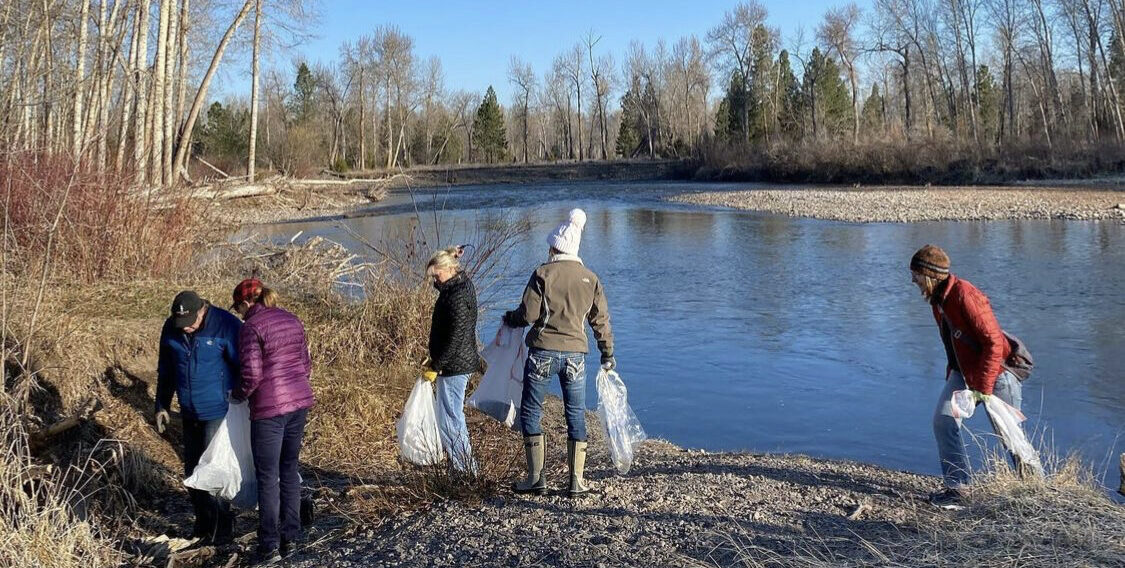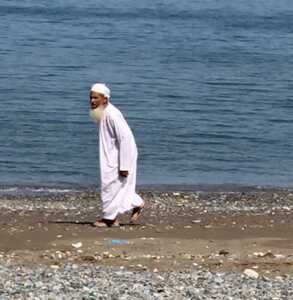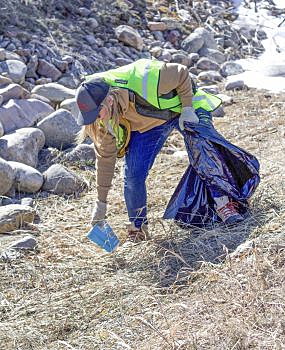Clark Fork Litter Is a Global Issue
April 11, 2022

by Sam Dwyer

I’ve spent 94.9% of my life in Montana, but a few years ago I had an opportunity to work at an international school in the Middle East. When I moved to Oman, one of the most striking cultural differences wasn’t the Arabic language or the abayas—there was a large expat population with a mix of languages and styles in which I could find familiarity. For me, it was litter in “wild” spaces. One of our first weekends, we drove a couple hours up Jebel Shams, a remote mountain, to camp with friends. We spent a good amount of our time collecting trash to haul back down the mountain. For some field trips we took students to the ocean to fill dozens of garbage bags with plastic we found along the beach.
“It’s a young country,” I was told. “The US was the same in ’70s.” And indeed, it took marketing and education campaigns and fines to shift Americans’ attitudes about throwing things “away” by tossing them out the car window on the highway—and we still have a ways to go.
In Oman, not all the litter comes from residents either. Like any coastal society, much of it washes ashore from other places. Living near the ocean, it’s sometimes easier to see how interconnected the planet is. Foreign trash and rising water levels are in your backyard.
But we are interconnected wherever we are. As isolated and landlocked as Montana may seem, pollution from around the world impacts this watershed. Carbon from as far away as China lands on snow in the high country and accelerates melting. And our litter moves downstream to affect other areas. Plastic bottles dropped in the river eventually become microplastic marine snow endlessly circulating in the Pacific.
A Campaign Against Litter
According to the nonprofit Keep America Beautiful, the total amount of litter in America is down 61% since 1969. However, plastic litter has increased 165% in that time. Roadways and waterways in the US are the most common places to find litter, with slightly more along waterways. That’s true here in Montana, too.
While the most effective action we can take is to stop littering, it also helps to clean up dirty areas. About 85% of littering is the result of individuals intentionally dropping, flicking, flinging, and abandoning their garbage. And if we see litter around, we’re more likely to add our own bits of trash.
A Keep America Beautiful study in 2020 found that a strong contributing factor to littering is how much litter already exists in the environment. To counteract that effect, we can collect plastic and other litter that has been tossed, dropped, or blown across the landscape and recycle it or pile it up in a central landfill.
Be Part of the Solution

One way you can be a part of the solution is to join the Clark Fork Coalition and hundreds of volunteers for the 2022 Clark Fork River Cleanup, Thursday, April 21 through Sunday, April 24. This DIY river service event is fun, family-friendly, and helps clean up some 180 miles of riverbank in the Clark Fork basin.
You can register online for your favorite section of river (or add your own) then head out anytime during the four-day period to collect trash and recyclables. Drop off garbage and recycling afterward at three convenient sites around town.
The Clark Fork Coalition provides vinyl gloves and biodegradable bags or reusable five-gallon buckets for recyclable materials. Supplies can be picked up at The Clark Fork Coalition office at 140 S. 4th Street W. between 11 a.m. and 2 p.m. April 18–22.
In a river town like Missoula, we get so much from the waterway that connects us. From beauty and recreation, to economic and cultural benefits, to aquatic resources, we humans benefit from what the river gives. But a healthy relationship with the river requires that the river also benefit from us. We can take care of the plants, fish, and wildlife that are part of the ecosystem by choosing where we develop, how we landscape, how much water we pull from the system for our use. And we can pick up our trash.
Learn more about the 2022 Clark Fork River Cleanup or register a team.
